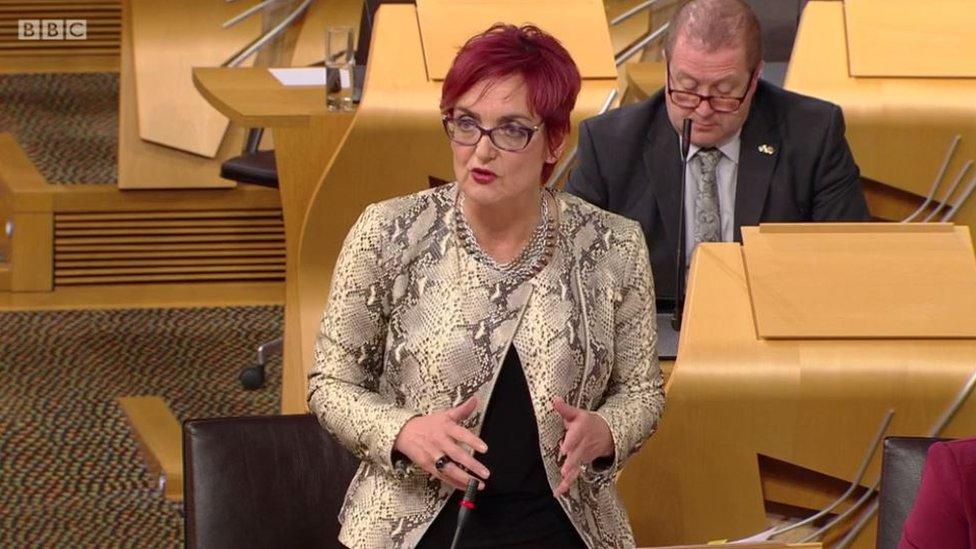UK urged to ratify Istanbul Convention by Scottish government
- Published

Angela Constance is to lead a parliament debate condemning violence against women
Scotland's communities secretary has called on the UK government to ratify the "Istanbul Convention" on combating violence against women and girls.
Angela Constance has written to Home Secretary Amber Rudd asking for a "clear timetable" for ratification of the Council of Europe convention.
The UK government signed up to the convention in June 2012, but is yet to formally ratify it.
A private members' bill, external on the topic has also been lodged at Westminster.
The UK government has previously said it was studying concerns about parts of the convention cutting across local legal jurisdictions.
Ms Constance, who is to lead a Holyrood debate to mark the International Day for the Elimination of Violence Against Women, wrote to Ms Rudd asking her to commit to the Istanbul Convention and engage with the devolved administrations over it.
The Council of Europe convention, external states that "it is the obligation of the state to fully address" violence against women "in all its forms", take measures to prevent it, protect its victims and prosecute perpetrators.
It was written in April 2011, and while the UK government signed up to it the following year it is yet to ratify it.
In her letter to the home secretary, Ms Constance said the Scottish government "strongly support the principles and aspirations of the Istanbul Convention".
She wrote: "I know that both our governments share a commitment to ending violence against women and girls once and for all. We wish to see a clear timetable for ratification laid out."
Ms Constance added: "There is no more time for foot dragging. It has been more than four years since the UK government signed this important convention and two years since it came to force.
"The ratification of the Istanbul Convention would ensure a focus on the further work necessary to seek to end gender-based violence once and for all and I sincerely hope that we will hear back from the UK government with a positive response soon."
Marsha Scott of Scottish Women's Aid said the UK government "has within its grasp to make history" by ratifying the convention.
She said: "The Istanbul Convention is probably the very best piece of violence against women policy that has been written ever, anywhere. It is a blueprint for how we move from small change at the margins, services that are picking up too few people, too late, to a system that is designed to end domestic abuse and violence against women."
'Good record'
In February, MP Karen Bradley, then a Home Office minister, said there was an issue with part of the convention about "extraterritoriality", the issue of local legal jurisdictions.
She said when the issue had been clarified and relevant legislation passed, the government would ratify the convention.
Theresa May, who was Home Secretary when the UK signed up to the convention, was asked about it during her first session of questions to the prime minister in July.
She said: "It is important to deal with the issues of gender violence and domestic violence against women and girls. That is why the government have - I led this as Home Secretary - a strategy to deal with violence against women and girls.
"We have a good record on what we have done, for example, putting into operation domestic violence protection orders and the new coercive control offence, but there is always more to do and we will be doing that."
SNP MP Eilidh Whiteford has put forward a private members' bill at Westminster calling on the UK government to ratify the convention, which is due for its second reading later in the month.
- Published11 May 2011
